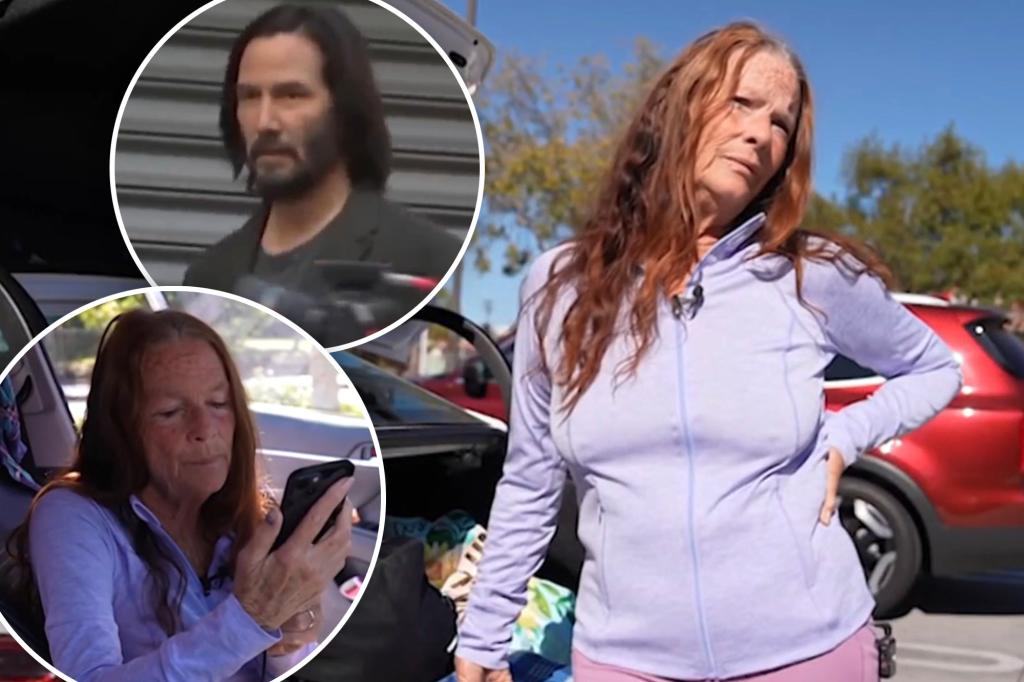Katherine Goodson, a 67-year-old widow from San Diego, found herself ensnared in a cruel deception that stripped her of her life savings and left her homeless. Her story serves as a stark warning about the increasing prevalence and devastating impact of online romance scams, particularly those targeting vulnerable elderly individuals. Goodson’s ordeal began in 2022, shortly after she relocated to San Diego. A seemingly innocuous text message from someone claiming to be Hollywood actor Keanu Reeves marked the beginning of her descent into a meticulously crafted trap. The impersonator initially requested a $500 gift card, ostensibly to prove Goodson’s sincerity. Although she initially questioned the request and even blocked the number after hearing the impersonator’s voice, the seeds of doubt had been sown.
The complexity of the scam unfolded when another individual contacted Goodson, claiming to be the real Keanu Reeves. This individual apologized for the previous scam attempt, expressing sympathy for Goodson’s experience. This seemingly empathetic gesture quickly evolved into a whirlwind online romance. Goodson, widowed since 2007 and admittedly lonely, found herself drawn into the illusion of a relationship with a beloved celebrity. The scammer expertly played on her emotions, showering her with attention and promises of marriage. The illusion was carefully maintained through consistent text communication, while cleverly avoiding any in-person meetings. Excuses were readily offered, further solidifying the deception in Goodson’s mind.
Over the course of two years, the emotional manipulation escalated into financial exploitation. Goodson, blinded by the fabricated romance, sent money, gift cards, and even Bitcoin to the scammer, totaling over $60,000. The deception extended beyond the supposed "Reeves" persona, involving other individuals claiming to be members of his management team. This elaborate network of fake identities added a layer of legitimacy to the scam, making it even more difficult for Goodson to recognize the truth. The relentless requests for financial assistance were presented under various pretexts, preying on Goodson’s emotional investment in the fabricated relationship.
The devastating consequences of the scam became painfully apparent in August of 2023 when Goodson’s funds were completely depleted. At this point, the charade abruptly ended, and the messages from "Reeves" and his "team" turned hostile. The stark reality of her situation crashed down upon her, leaving her in a state of shock and disbelief. The emotional and psychological toll of the betrayal compounded the financial devastation. Goodson found herself homeless, living in her car, and struggling to comprehend the magnitude of the deception. The intricate web of lies had not only robbed her of her savings but also shattered her trust and sense of security.
Goodson’s story, while heartbreaking, is unfortunately not unique. The Federal Bureau of Investigation (FBI) reported a staggering $1.1 billion lost to romance scams across the United States in 2023. These scams prey on individuals seeking connection and companionship, often exploiting vulnerabilities such as loneliness, grief, or isolation. The perpetrators are skilled manipulators who employ sophisticated tactics to build trust and exploit their victims’ emotions. The use of celebrity impersonation, as in Goodson’s case, adds another layer of allure and deception, making the scam even more enticing and difficult to detect. The anonymity of online interactions allows scammers to create elaborate false identities and maintain the illusion of a genuine relationship.
Goodson, despite her devastating experience, has bravely chosen to share her story to warn others about the dangers of online romance scams. Her willingness to speak out underscores the importance of raising awareness and educating individuals about the deceptive tactics employed by these criminals. She hopes that her experience can serve as a cautionary tale, prompting individuals to exercise caution and skepticism when engaging in online relationships. Her story highlights the need for increased vigilance, particularly for vulnerable populations like the elderly, who may be more susceptible to these types of scams. It also emphasizes the importance of seeking support and reporting suspected scams to the appropriate authorities.
The rise in online romance scams necessitates a multi-pronged approach to combat this growing threat. Increased public awareness campaigns, educational resources, and law enforcement efforts are crucial in protecting individuals from falling victim to these devastating schemes. Technology companies also have a role to play in implementing measures to identify and prevent fraudulent activity on their platforms. Ultimately, a collective effort is needed to safeguard individuals from the emotional and financial devastation inflicted by online romance scams, ensuring that stories like Katherine Goodson’s become less frequent and less devastating.

